Islam and Policing in Modern World: Benefits and Challenges of Pillars
VerifiedAdded on 2022/10/06
|10
|2749
|29
Essay
AI Summary
This essay delves into the spiritual significance of the five pillars of Islam: Shahadah (declaration of faith), Salat (prayer), Zakat (charity), Sawm (fasting), and Hajj (pilgrimage). It analyzes the importance of these pillars in the lives of Muslims and examines the benefits and challenges experienced by Western Muslims in practicing them within a Western context. The essay discusses the historical and cultural influences on Islamic practices, considering how Western and Islamic traditions have interacted and evolved. It explores how perceptions of Islam and its practices, such as veiling, are shaped by media portrayals and societal views in the West. The essay highlights the diverse interpretations and practices of Islam across different communities and how these are influenced by local cultures and socio-political contexts. It also addresses the impact of secularism, anti-terrorism measures, and societal biases on the practice of Islam in Western countries. The essay draws on various scholarly sources to provide a comprehensive understanding of the challenges and opportunities faced by Muslims in the modern world, emphasizing the importance of understanding and respecting the diverse expressions of Islamic faith and practice. Furthermore, it acknowledges the significance of the five pillars in offering great advantages to educators and therapists who have been seeking to realize and assist Muslim families who are practicing the Five Pillars of Islam. The essay concludes by reiterating the diversity within the Islamic faith, the role of local cultural perspectives, and the varied interpretations of the five pillars across different contexts.
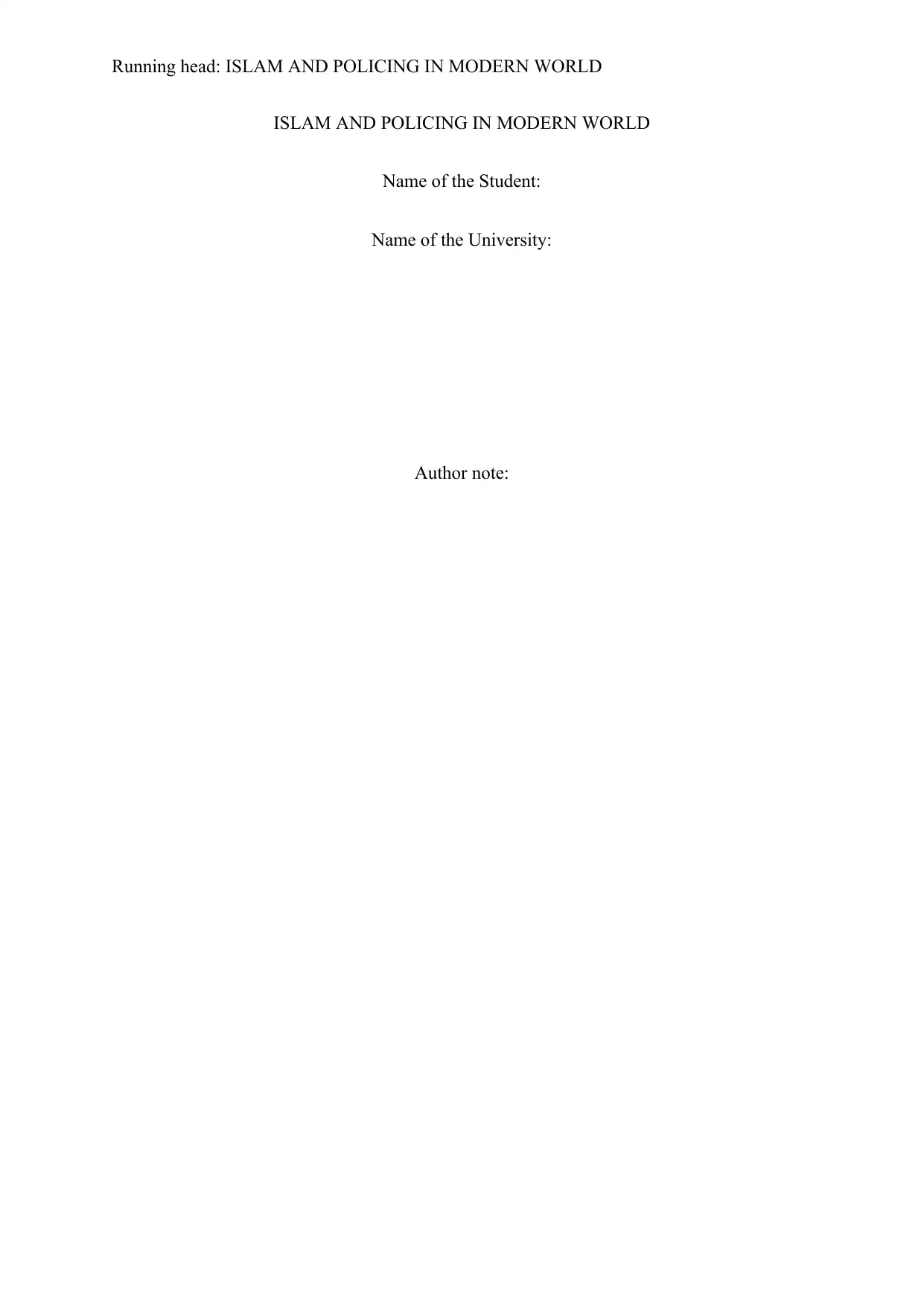
Running head: ISLAM AND POLICING IN MODERN WORLD
ISLAM AND POLICING IN MODERN WORLD
Name of the Student:
Name of the University:
Author note:
ISLAM AND POLICING IN MODERN WORLD
Name of the Student:
Name of the University:
Author note:
Paraphrase This Document
Need a fresh take? Get an instant paraphrase of this document with our AI Paraphraser
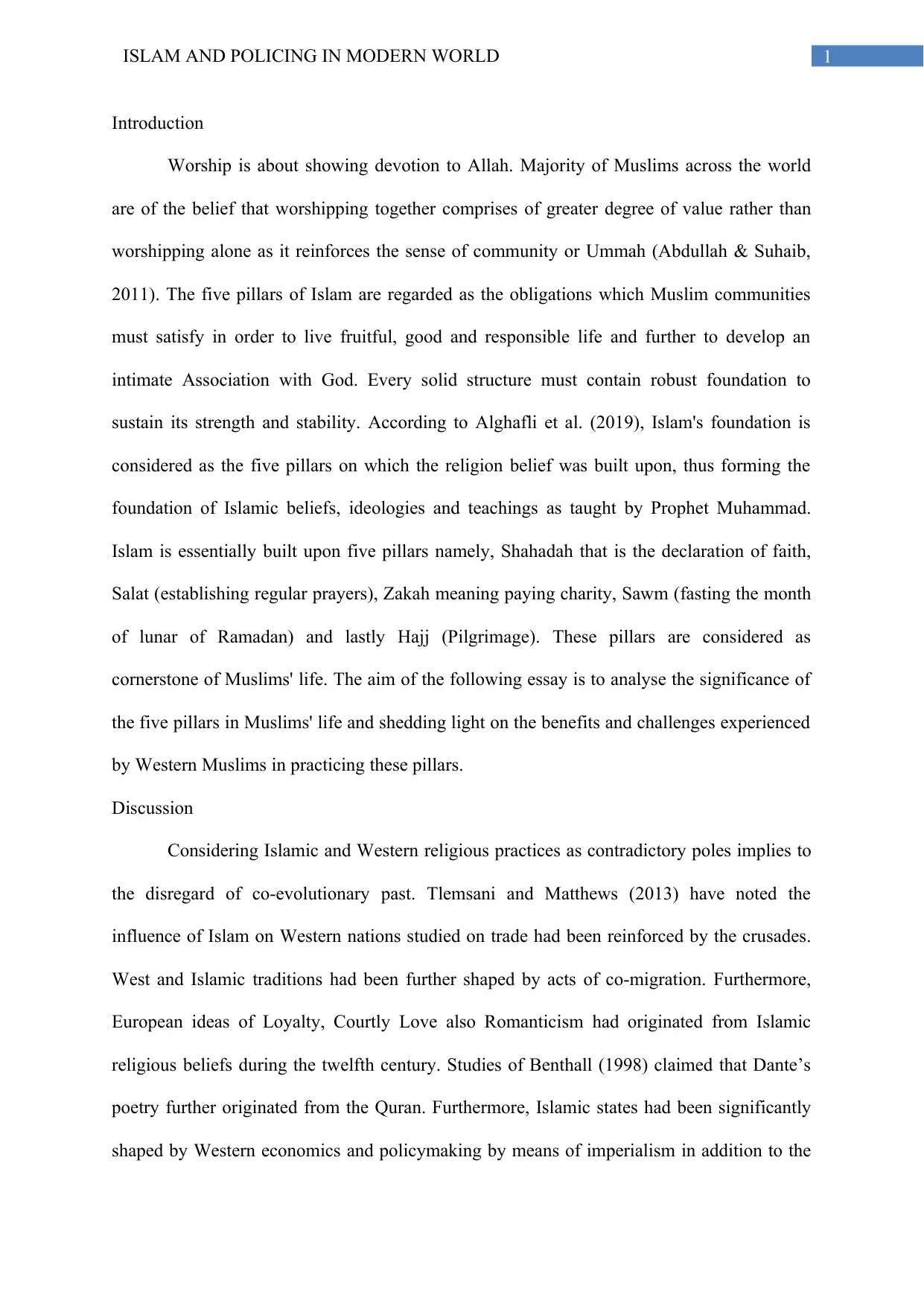
1ISLAM AND POLICING IN MODERN WORLD
Introduction
Worship is about showing devotion to Allah. Majority of Muslims across the world
are of the belief that worshipping together comprises of greater degree of value rather than
worshipping alone as it reinforces the sense of community or Ummah (Abdullah & Suhaib,
2011). The five pillars of Islam are regarded as the obligations which Muslim communities
must satisfy in order to live fruitful, good and responsible life and further to develop an
intimate Association with God. Every solid structure must contain robust foundation to
sustain its strength and stability. According to Alghafli et al. (2019), Islam's foundation is
considered as the five pillars on which the religion belief was built upon, thus forming the
foundation of Islamic beliefs, ideologies and teachings as taught by Prophet Muhammad.
Islam is essentially built upon five pillars namely, Shahadah that is the declaration of faith,
Salat (establishing regular prayers), Zakah meaning paying charity, Sawm (fasting the month
of lunar of Ramadan) and lastly Hajj (Pilgrimage). These pillars are considered as
cornerstone of Muslims' life. The aim of the following essay is to analyse the significance of
the five pillars in Muslims' life and shedding light on the benefits and challenges experienced
by Western Muslims in practicing these pillars.
Discussion
Considering Islamic and Western religious practices as contradictory poles implies to
the disregard of co-evolutionary past. Tlemsani and Matthews (2013) have noted the
influence of Islam on Western nations studied on trade had been reinforced by the crusades.
West and Islamic traditions had been further shaped by acts of co-migration. Furthermore,
European ideas of Loyalty, Courtly Love also Romanticism had originated from Islamic
religious beliefs during the twelfth century. Studies of Benthall (1998) claimed that Dante’s
poetry further originated from the Quran. Furthermore, Islamic states had been significantly
shaped by Western economics and policymaking by means of imperialism in addition to the
Introduction
Worship is about showing devotion to Allah. Majority of Muslims across the world
are of the belief that worshipping together comprises of greater degree of value rather than
worshipping alone as it reinforces the sense of community or Ummah (Abdullah & Suhaib,
2011). The five pillars of Islam are regarded as the obligations which Muslim communities
must satisfy in order to live fruitful, good and responsible life and further to develop an
intimate Association with God. Every solid structure must contain robust foundation to
sustain its strength and stability. According to Alghafli et al. (2019), Islam's foundation is
considered as the five pillars on which the religion belief was built upon, thus forming the
foundation of Islamic beliefs, ideologies and teachings as taught by Prophet Muhammad.
Islam is essentially built upon five pillars namely, Shahadah that is the declaration of faith,
Salat (establishing regular prayers), Zakah meaning paying charity, Sawm (fasting the month
of lunar of Ramadan) and lastly Hajj (Pilgrimage). These pillars are considered as
cornerstone of Muslims' life. The aim of the following essay is to analyse the significance of
the five pillars in Muslims' life and shedding light on the benefits and challenges experienced
by Western Muslims in practicing these pillars.
Discussion
Considering Islamic and Western religious practices as contradictory poles implies to
the disregard of co-evolutionary past. Tlemsani and Matthews (2013) have noted the
influence of Islam on Western nations studied on trade had been reinforced by the crusades.
West and Islamic traditions had been further shaped by acts of co-migration. Furthermore,
European ideas of Loyalty, Courtly Love also Romanticism had originated from Islamic
religious beliefs during the twelfth century. Studies of Benthall (1998) claimed that Dante’s
poetry further originated from the Quran. Furthermore, Islamic states had been significantly
shaped by Western economics and policymaking by means of imperialism in addition to the
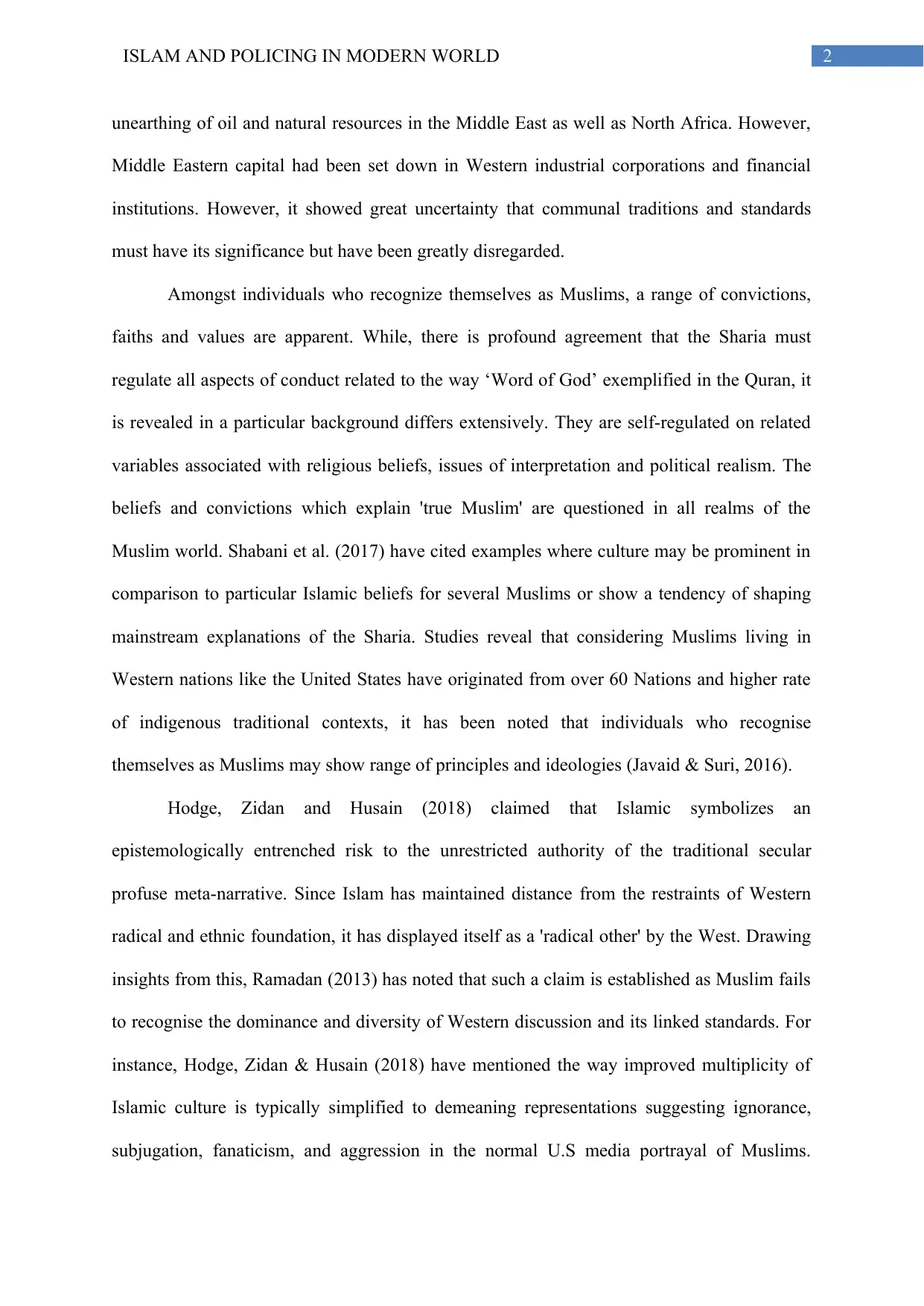
2ISLAM AND POLICING IN MODERN WORLD
unearthing of oil and natural resources in the Middle East as well as North Africa. However,
Middle Eastern capital had been set down in Western industrial corporations and financial
institutions. However, it showed great uncertainty that communal traditions and standards
must have its significance but have been greatly disregarded.
Amongst individuals who recognize themselves as Muslims, a range of convictions,
faiths and values are apparent. While, there is profound agreement that the Sharia must
regulate all aspects of conduct related to the way ‘Word of God’ exemplified in the Quran, it
is revealed in a particular background differs extensively. They are self-regulated on related
variables associated with religious beliefs, issues of interpretation and political realism. The
beliefs and convictions which explain 'true Muslim' are questioned in all realms of the
Muslim world. Shabani et al. (2017) have cited examples where culture may be prominent in
comparison to particular Islamic beliefs for several Muslims or show a tendency of shaping
mainstream explanations of the Sharia. Studies reveal that considering Muslims living in
Western nations like the United States have originated from over 60 Nations and higher rate
of indigenous traditional contexts, it has been noted that individuals who recognise
themselves as Muslims may show range of principles and ideologies (Javaid & Suri, 2016).
Hodge, Zidan and Husain (2018) claimed that Islamic symbolizes an
epistemologically entrenched risk to the unrestricted authority of the traditional secular
profuse meta-narrative. Since Islam has maintained distance from the restraints of Western
radical and ethnic foundation, it has displayed itself as a 'radical other' by the West. Drawing
insights from this, Ramadan (2013) has noted that such a claim is established as Muslim fails
to recognise the dominance and diversity of Western discussion and its linked standards. For
instance, Hodge, Zidan & Husain (2018) have mentioned the way improved multiplicity of
Islamic culture is typically simplified to demeaning representations suggesting ignorance,
subjugation, fanaticism, and aggression in the normal U.S media portrayal of Muslims.
unearthing of oil and natural resources in the Middle East as well as North Africa. However,
Middle Eastern capital had been set down in Western industrial corporations and financial
institutions. However, it showed great uncertainty that communal traditions and standards
must have its significance but have been greatly disregarded.
Amongst individuals who recognize themselves as Muslims, a range of convictions,
faiths and values are apparent. While, there is profound agreement that the Sharia must
regulate all aspects of conduct related to the way ‘Word of God’ exemplified in the Quran, it
is revealed in a particular background differs extensively. They are self-regulated on related
variables associated with religious beliefs, issues of interpretation and political realism. The
beliefs and convictions which explain 'true Muslim' are questioned in all realms of the
Muslim world. Shabani et al. (2017) have cited examples where culture may be prominent in
comparison to particular Islamic beliefs for several Muslims or show a tendency of shaping
mainstream explanations of the Sharia. Studies reveal that considering Muslims living in
Western nations like the United States have originated from over 60 Nations and higher rate
of indigenous traditional contexts, it has been noted that individuals who recognise
themselves as Muslims may show range of principles and ideologies (Javaid & Suri, 2016).
Hodge, Zidan and Husain (2018) claimed that Islamic symbolizes an
epistemologically entrenched risk to the unrestricted authority of the traditional secular
profuse meta-narrative. Since Islam has maintained distance from the restraints of Western
radical and ethnic foundation, it has displayed itself as a 'radical other' by the West. Drawing
insights from this, Ramadan (2013) has noted that such a claim is established as Muslim fails
to recognise the dominance and diversity of Western discussion and its linked standards. For
instance, Hodge, Zidan & Husain (2018) have mentioned the way improved multiplicity of
Islamic culture is typically simplified to demeaning representations suggesting ignorance,
subjugation, fanaticism, and aggression in the normal U.S media portrayal of Muslims.
⊘ This is a preview!⊘
Do you want full access?
Subscribe today to unlock all pages.

Trusted by 1+ million students worldwide
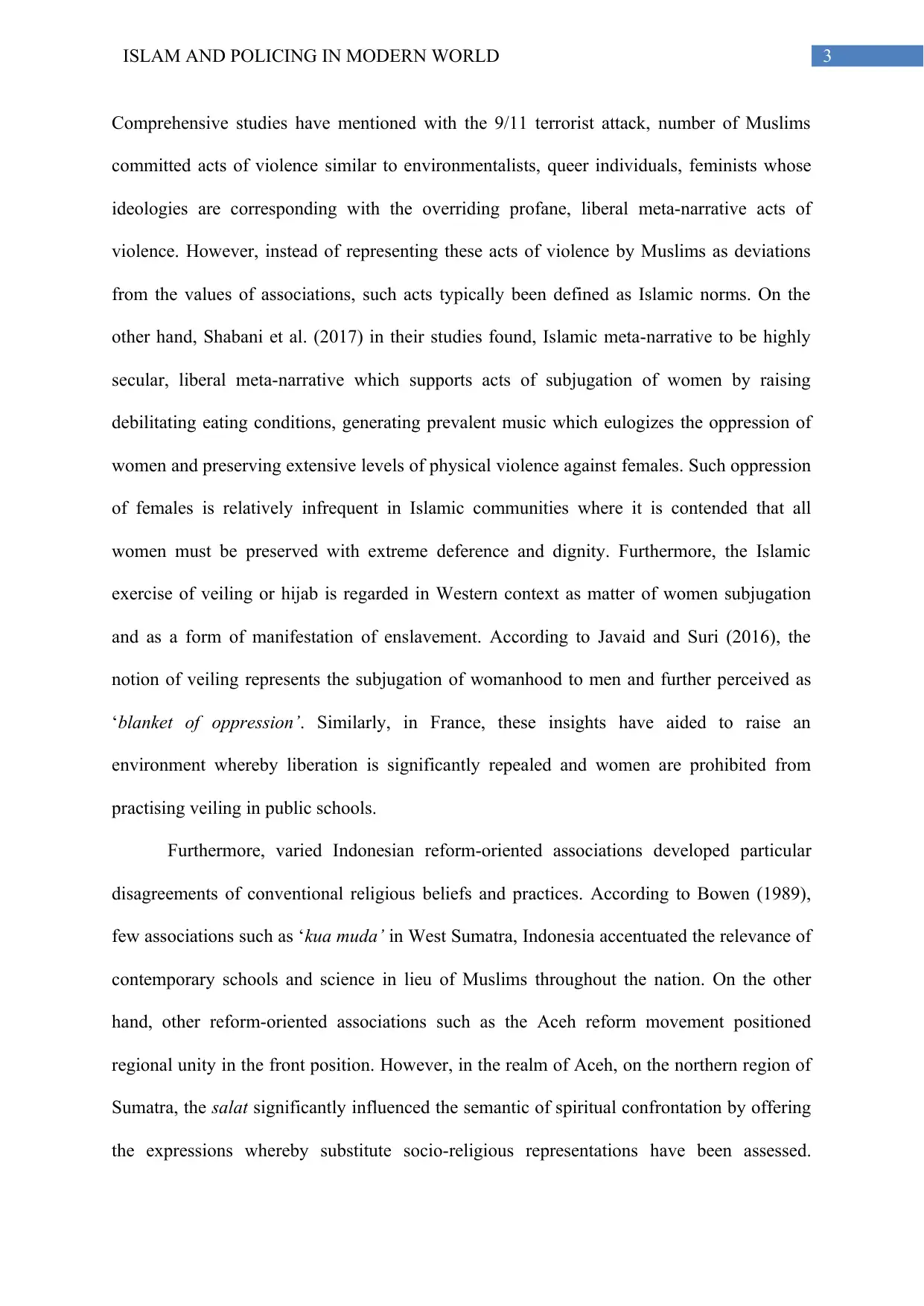
3ISLAM AND POLICING IN MODERN WORLD
Comprehensive studies have mentioned with the 9/11 terrorist attack, number of Muslims
committed acts of violence similar to environmentalists, queer individuals, feminists whose
ideologies are corresponding with the overriding profane, liberal meta-narrative acts of
violence. However, instead of representing these acts of violence by Muslims as deviations
from the values of associations, such acts typically been defined as Islamic norms. On the
other hand, Shabani et al. (2017) in their studies found, Islamic meta-narrative to be highly
secular, liberal meta-narrative which supports acts of subjugation of women by raising
debilitating eating conditions, generating prevalent music which eulogizes the oppression of
women and preserving extensive levels of physical violence against females. Such oppression
of females is relatively infrequent in Islamic communities where it is contended that all
women must be preserved with extreme deference and dignity. Furthermore, the Islamic
exercise of veiling or hijab is regarded in Western context as matter of women subjugation
and as a form of manifestation of enslavement. According to Javaid and Suri (2016), the
notion of veiling represents the subjugation of womanhood to men and further perceived as
‘blanket of oppression’. Similarly, in France, these insights have aided to raise an
environment whereby liberation is significantly repealed and women are prohibited from
practising veiling in public schools.
Furthermore, varied Indonesian reform-oriented associations developed particular
disagreements of conventional religious beliefs and practices. According to Bowen (1989),
few associations such as ‘kua muda’ in West Sumatra, Indonesia accentuated the relevance of
contemporary schools and science in lieu of Muslims throughout the nation. On the other
hand, other reform-oriented associations such as the Aceh reform movement positioned
regional unity in the front position. However, in the realm of Aceh, on the northern region of
Sumatra, the salat significantly influenced the semantic of spiritual confrontation by offering
the expressions whereby substitute socio-religious representations have been assessed.
Comprehensive studies have mentioned with the 9/11 terrorist attack, number of Muslims
committed acts of violence similar to environmentalists, queer individuals, feminists whose
ideologies are corresponding with the overriding profane, liberal meta-narrative acts of
violence. However, instead of representing these acts of violence by Muslims as deviations
from the values of associations, such acts typically been defined as Islamic norms. On the
other hand, Shabani et al. (2017) in their studies found, Islamic meta-narrative to be highly
secular, liberal meta-narrative which supports acts of subjugation of women by raising
debilitating eating conditions, generating prevalent music which eulogizes the oppression of
women and preserving extensive levels of physical violence against females. Such oppression
of females is relatively infrequent in Islamic communities where it is contended that all
women must be preserved with extreme deference and dignity. Furthermore, the Islamic
exercise of veiling or hijab is regarded in Western context as matter of women subjugation
and as a form of manifestation of enslavement. According to Javaid and Suri (2016), the
notion of veiling represents the subjugation of womanhood to men and further perceived as
‘blanket of oppression’. Similarly, in France, these insights have aided to raise an
environment whereby liberation is significantly repealed and women are prohibited from
practising veiling in public schools.
Furthermore, varied Indonesian reform-oriented associations developed particular
disagreements of conventional religious beliefs and practices. According to Bowen (1989),
few associations such as ‘kua muda’ in West Sumatra, Indonesia accentuated the relevance of
contemporary schools and science in lieu of Muslims throughout the nation. On the other
hand, other reform-oriented associations such as the Aceh reform movement positioned
regional unity in the front position. However, in the realm of Aceh, on the northern region of
Sumatra, the salat significantly influenced the semantic of spiritual confrontation by offering
the expressions whereby substitute socio-religious representations have been assessed.
Paraphrase This Document
Need a fresh take? Get an instant paraphrase of this document with our AI Paraphraser
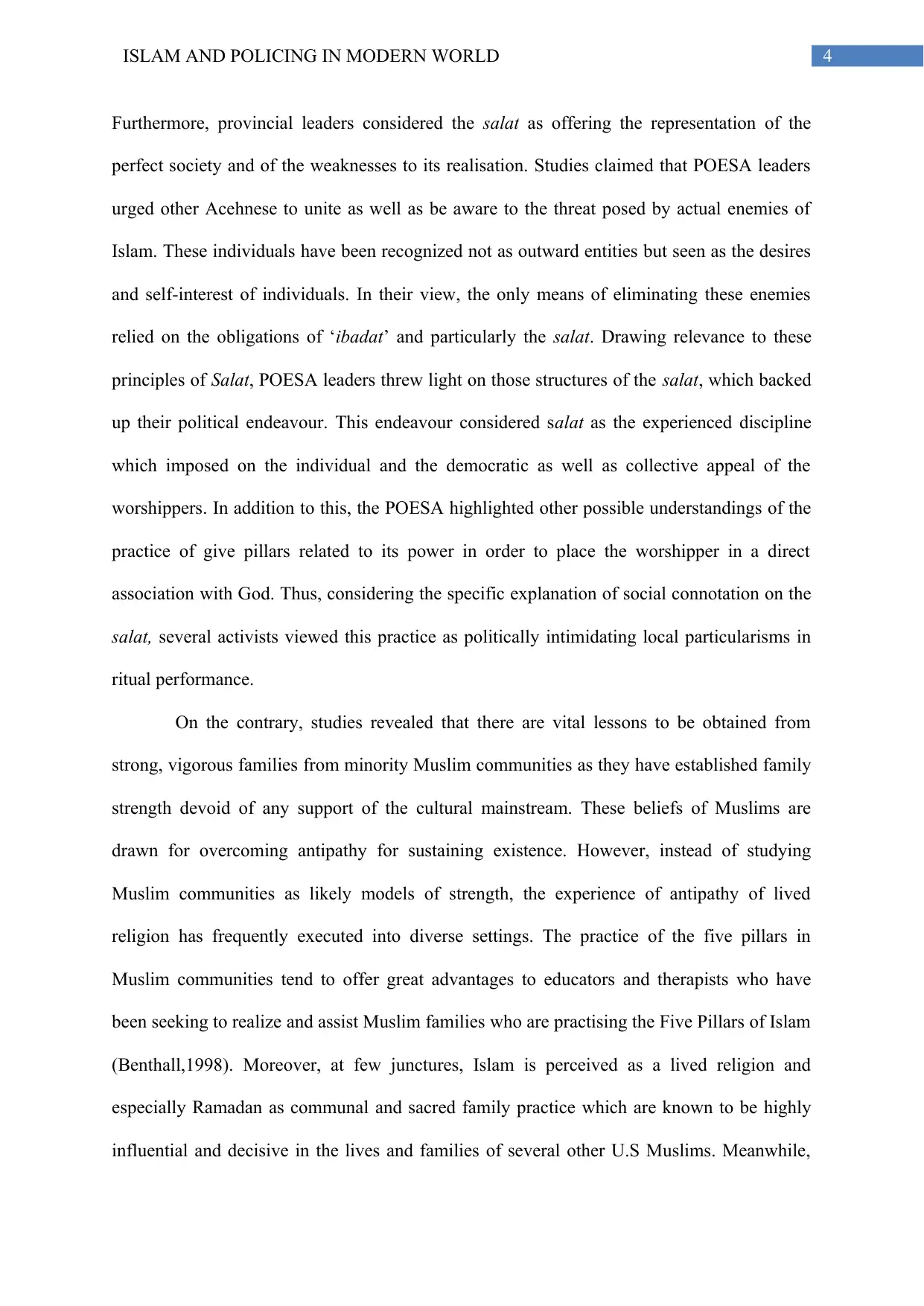
4ISLAM AND POLICING IN MODERN WORLD
Furthermore, provincial leaders considered the salat as offering the representation of the
perfect society and of the weaknesses to its realisation. Studies claimed that POESA leaders
urged other Acehnese to unite as well as be aware to the threat posed by actual enemies of
Islam. These individuals have been recognized not as outward entities but seen as the desires
and self-interest of individuals. In their view, the only means of eliminating these enemies
relied on the obligations of ‘ibadat’ and particularly the salat. Drawing relevance to these
principles of Salat, POESA leaders threw light on those structures of the salat, which backed
up their political endeavour. This endeavour considered salat as the experienced discipline
which imposed on the individual and the democratic as well as collective appeal of the
worshippers. In addition to this, the POESA highlighted other possible understandings of the
practice of give pillars related to its power in order to place the worshipper in a direct
association with God. Thus, considering the specific explanation of social connotation on the
salat, several activists viewed this practice as politically intimidating local particularisms in
ritual performance.
On the contrary, studies revealed that there are vital lessons to be obtained from
strong, vigorous families from minority Muslim communities as they have established family
strength devoid of any support of the cultural mainstream. These beliefs of Muslims are
drawn for overcoming antipathy for sustaining existence. However, instead of studying
Muslim communities as likely models of strength, the experience of antipathy of lived
religion has frequently executed into diverse settings. The practice of the five pillars in
Muslim communities tend to offer great advantages to educators and therapists who have
been seeking to realize and assist Muslim families who are practising the Five Pillars of Islam
(Benthall,1998). Moreover, at few junctures, Islam is perceived as a lived religion and
especially Ramadan as communal and sacred family practice which are known to be highly
influential and decisive in the lives and families of several other U.S Muslims. Meanwhile,
Furthermore, provincial leaders considered the salat as offering the representation of the
perfect society and of the weaknesses to its realisation. Studies claimed that POESA leaders
urged other Acehnese to unite as well as be aware to the threat posed by actual enemies of
Islam. These individuals have been recognized not as outward entities but seen as the desires
and self-interest of individuals. In their view, the only means of eliminating these enemies
relied on the obligations of ‘ibadat’ and particularly the salat. Drawing relevance to these
principles of Salat, POESA leaders threw light on those structures of the salat, which backed
up their political endeavour. This endeavour considered salat as the experienced discipline
which imposed on the individual and the democratic as well as collective appeal of the
worshippers. In addition to this, the POESA highlighted other possible understandings of the
practice of give pillars related to its power in order to place the worshipper in a direct
association with God. Thus, considering the specific explanation of social connotation on the
salat, several activists viewed this practice as politically intimidating local particularisms in
ritual performance.
On the contrary, studies revealed that there are vital lessons to be obtained from
strong, vigorous families from minority Muslim communities as they have established family
strength devoid of any support of the cultural mainstream. These beliefs of Muslims are
drawn for overcoming antipathy for sustaining existence. However, instead of studying
Muslim communities as likely models of strength, the experience of antipathy of lived
religion has frequently executed into diverse settings. The practice of the five pillars in
Muslim communities tend to offer great advantages to educators and therapists who have
been seeking to realize and assist Muslim families who are practising the Five Pillars of Islam
(Benthall,1998). Moreover, at few junctures, Islam is perceived as a lived religion and
especially Ramadan as communal and sacred family practice which are known to be highly
influential and decisive in the lives and families of several other U.S Muslims. Meanwhile,
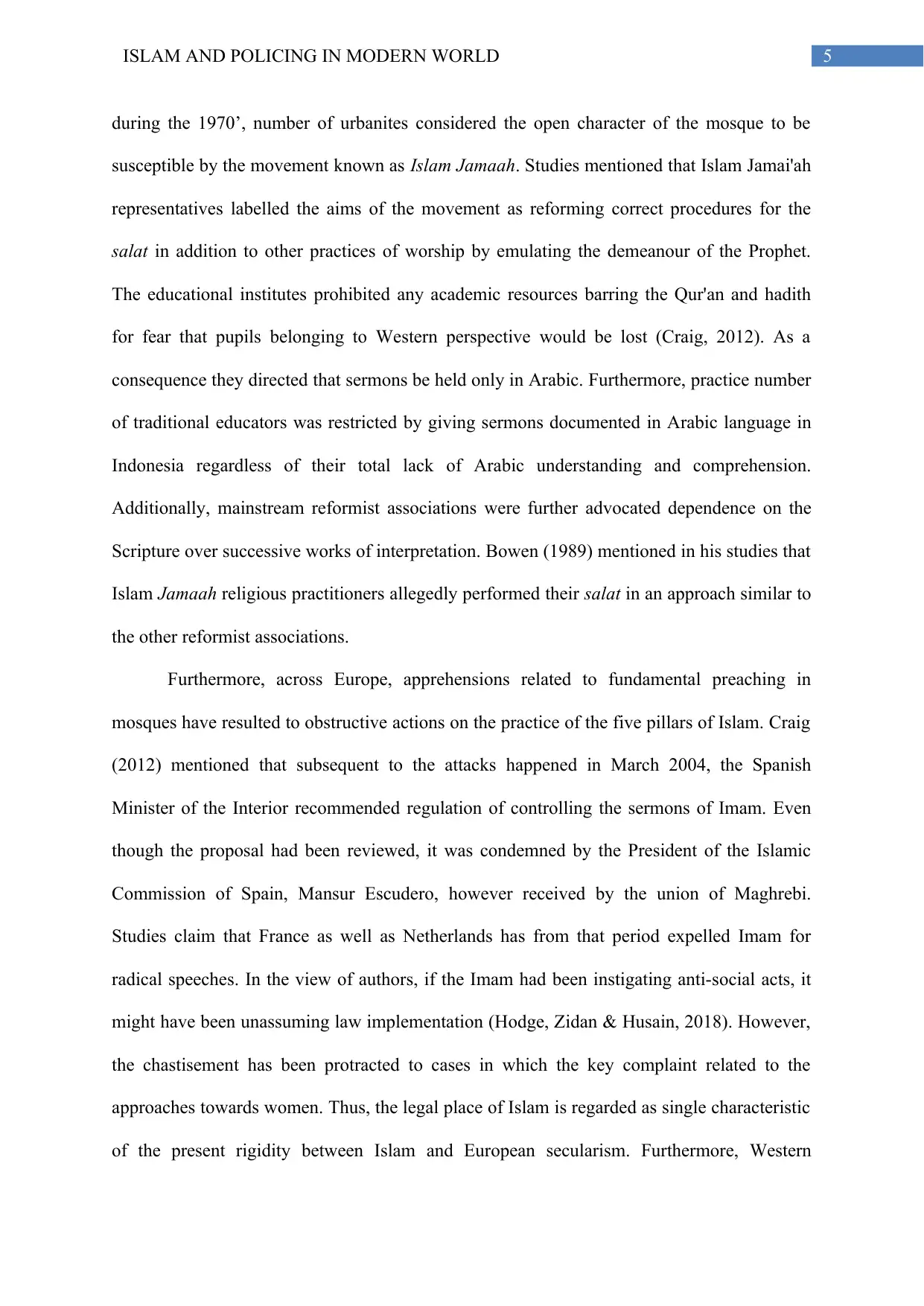
5ISLAM AND POLICING IN MODERN WORLD
during the 1970’, number of urbanites considered the open character of the mosque to be
susceptible by the movement known as Islam Jamaah. Studies mentioned that Islam Jamai'ah
representatives labelled the aims of the movement as reforming correct procedures for the
salat in addition to other practices of worship by emulating the demeanour of the Prophet.
The educational institutes prohibited any academic resources barring the Qur'an and hadith
for fear that pupils belonging to Western perspective would be lost (Craig, 2012). As a
consequence they directed that sermons be held only in Arabic. Furthermore, practice number
of traditional educators was restricted by giving sermons documented in Arabic language in
Indonesia regardless of their total lack of Arabic understanding and comprehension.
Additionally, mainstream reformist associations were further advocated dependence on the
Scripture over successive works of interpretation. Bowen (1989) mentioned in his studies that
Islam Jamaah religious practitioners allegedly performed their salat in an approach similar to
the other reformist associations.
Furthermore, across Europe, apprehensions related to fundamental preaching in
mosques have resulted to obstructive actions on the practice of the five pillars of Islam. Craig
(2012) mentioned that subsequent to the attacks happened in March 2004, the Spanish
Minister of the Interior recommended regulation of controlling the sermons of Imam. Even
though the proposal had been reviewed, it was condemned by the President of the Islamic
Commission of Spain, Mansur Escudero, however received by the union of Maghrebi.
Studies claim that France as well as Netherlands has from that period expelled Imam for
radical speeches. In the view of authors, if the Imam had been instigating anti-social acts, it
might have been unassuming law implementation (Hodge, Zidan & Husain, 2018). However,
the chastisement has been protracted to cases in which the key complaint related to the
approaches towards women. Thus, the legal place of Islam is regarded as single characteristic
of the present rigidity between Islam and European secularism. Furthermore, Western
during the 1970’, number of urbanites considered the open character of the mosque to be
susceptible by the movement known as Islam Jamaah. Studies mentioned that Islam Jamai'ah
representatives labelled the aims of the movement as reforming correct procedures for the
salat in addition to other practices of worship by emulating the demeanour of the Prophet.
The educational institutes prohibited any academic resources barring the Qur'an and hadith
for fear that pupils belonging to Western perspective would be lost (Craig, 2012). As a
consequence they directed that sermons be held only in Arabic. Furthermore, practice number
of traditional educators was restricted by giving sermons documented in Arabic language in
Indonesia regardless of their total lack of Arabic understanding and comprehension.
Additionally, mainstream reformist associations were further advocated dependence on the
Scripture over successive works of interpretation. Bowen (1989) mentioned in his studies that
Islam Jamaah religious practitioners allegedly performed their salat in an approach similar to
the other reformist associations.
Furthermore, across Europe, apprehensions related to fundamental preaching in
mosques have resulted to obstructive actions on the practice of the five pillars of Islam. Craig
(2012) mentioned that subsequent to the attacks happened in March 2004, the Spanish
Minister of the Interior recommended regulation of controlling the sermons of Imam. Even
though the proposal had been reviewed, it was condemned by the President of the Islamic
Commission of Spain, Mansur Escudero, however received by the union of Maghrebi.
Studies claim that France as well as Netherlands has from that period expelled Imam for
radical speeches. In the view of authors, if the Imam had been instigating anti-social acts, it
might have been unassuming law implementation (Hodge, Zidan & Husain, 2018). However,
the chastisement has been protracted to cases in which the key complaint related to the
approaches towards women. Thus, the legal place of Islam is regarded as single characteristic
of the present rigidity between Islam and European secularism. Furthermore, Western
⊘ This is a preview!⊘
Do you want full access?
Subscribe today to unlock all pages.

Trusted by 1+ million students worldwide
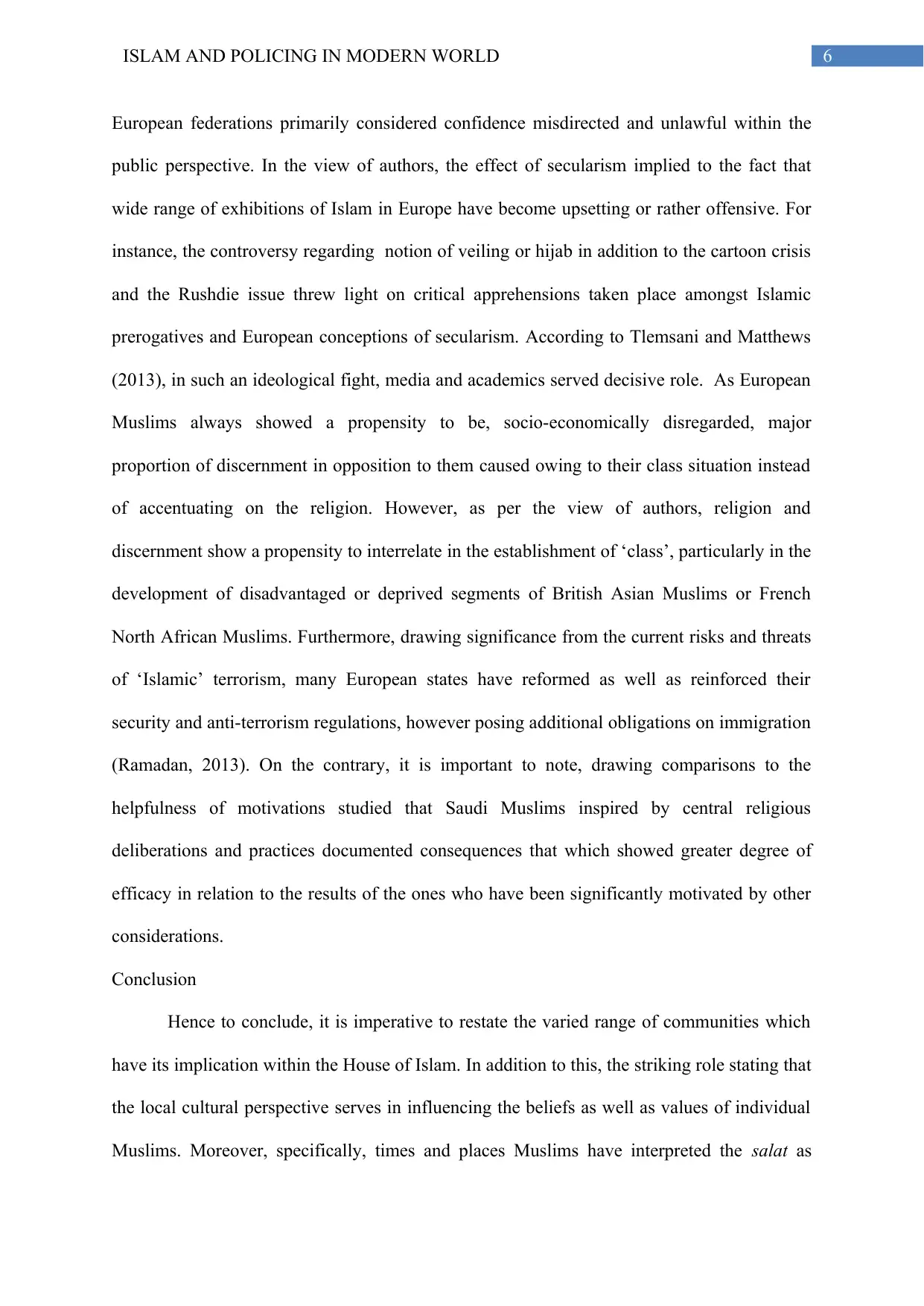
6ISLAM AND POLICING IN MODERN WORLD
European federations primarily considered confidence misdirected and unlawful within the
public perspective. In the view of authors, the effect of secularism implied to the fact that
wide range of exhibitions of Islam in Europe have become upsetting or rather offensive. For
instance, the controversy regarding notion of veiling or hijab in addition to the cartoon crisis
and the Rushdie issue threw light on critical apprehensions taken place amongst Islamic
prerogatives and European conceptions of secularism. According to Tlemsani and Matthews
(2013), in such an ideological fight, media and academics served decisive role. As European
Muslims always showed a propensity to be, socio-economically disregarded, major
proportion of discernment in opposition to them caused owing to their class situation instead
of accentuating on the religion. However, as per the view of authors, religion and
discernment show a propensity to interrelate in the establishment of ‘class’, particularly in the
development of disadvantaged or deprived segments of British Asian Muslims or French
North African Muslims. Furthermore, drawing significance from the current risks and threats
of ‘Islamic’ terrorism, many European states have reformed as well as reinforced their
security and anti-terrorism regulations, however posing additional obligations on immigration
(Ramadan, 2013). On the contrary, it is important to note, drawing comparisons to the
helpfulness of motivations studied that Saudi Muslims inspired by central religious
deliberations and practices documented consequences that which showed greater degree of
efficacy in relation to the results of the ones who have been significantly motivated by other
considerations.
Conclusion
Hence to conclude, it is imperative to restate the varied range of communities which
have its implication within the House of Islam. In addition to this, the striking role stating that
the local cultural perspective serves in influencing the beliefs as well as values of individual
Muslims. Moreover, specifically, times and places Muslims have interpreted the salat as
European federations primarily considered confidence misdirected and unlawful within the
public perspective. In the view of authors, the effect of secularism implied to the fact that
wide range of exhibitions of Islam in Europe have become upsetting or rather offensive. For
instance, the controversy regarding notion of veiling or hijab in addition to the cartoon crisis
and the Rushdie issue threw light on critical apprehensions taken place amongst Islamic
prerogatives and European conceptions of secularism. According to Tlemsani and Matthews
(2013), in such an ideological fight, media and academics served decisive role. As European
Muslims always showed a propensity to be, socio-economically disregarded, major
proportion of discernment in opposition to them caused owing to their class situation instead
of accentuating on the religion. However, as per the view of authors, religion and
discernment show a propensity to interrelate in the establishment of ‘class’, particularly in the
development of disadvantaged or deprived segments of British Asian Muslims or French
North African Muslims. Furthermore, drawing significance from the current risks and threats
of ‘Islamic’ terrorism, many European states have reformed as well as reinforced their
security and anti-terrorism regulations, however posing additional obligations on immigration
(Ramadan, 2013). On the contrary, it is important to note, drawing comparisons to the
helpfulness of motivations studied that Saudi Muslims inspired by central religious
deliberations and practices documented consequences that which showed greater degree of
efficacy in relation to the results of the ones who have been significantly motivated by other
considerations.
Conclusion
Hence to conclude, it is imperative to restate the varied range of communities which
have its implication within the House of Islam. In addition to this, the striking role stating that
the local cultural perspective serves in influencing the beliefs as well as values of individual
Muslims. Moreover, specifically, times and places Muslims have interpreted the salat as
Paraphrase This Document
Need a fresh take? Get an instant paraphrase of this document with our AI Paraphraser
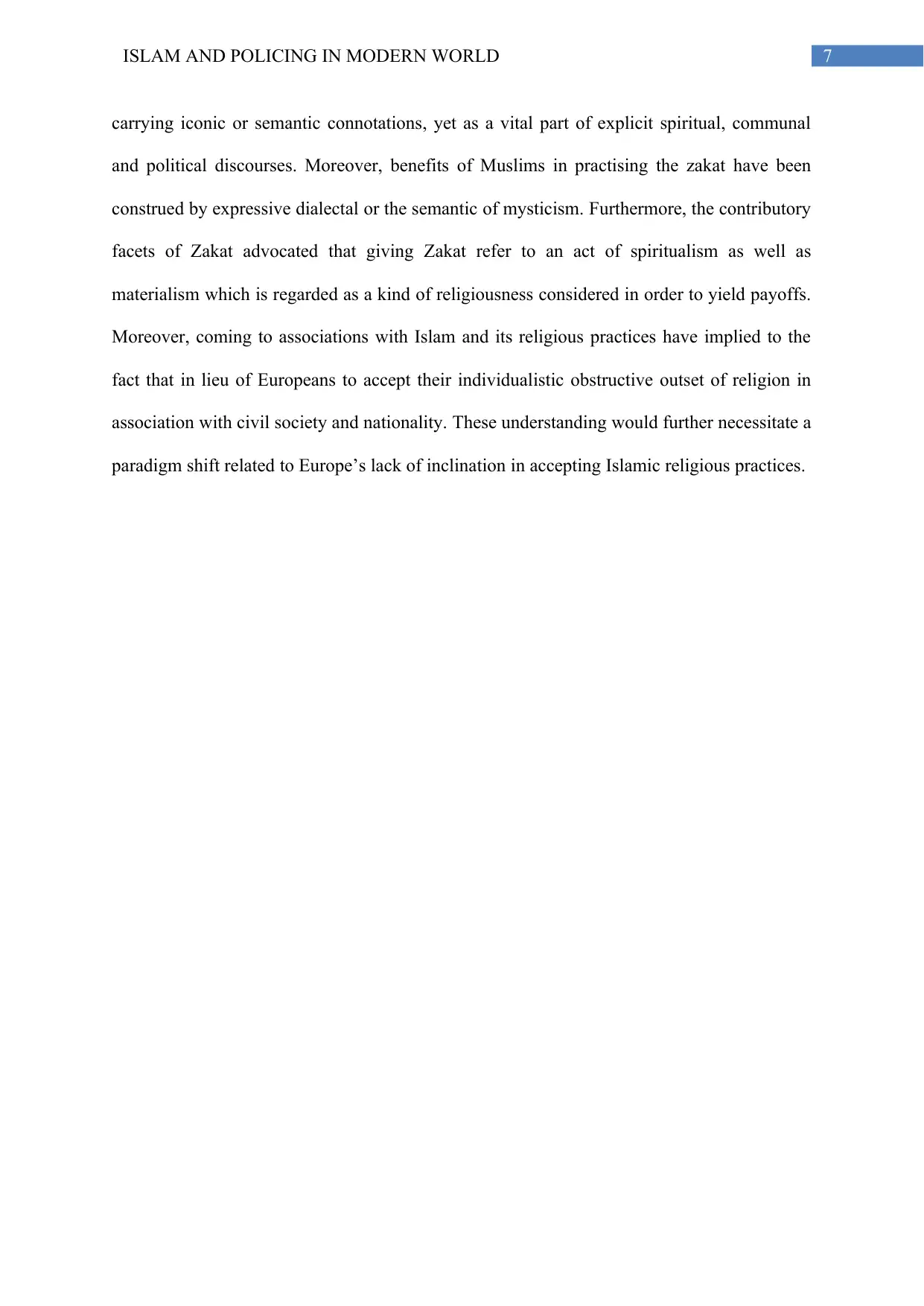
7ISLAM AND POLICING IN MODERN WORLD
carrying iconic or semantic connotations, yet as a vital part of explicit spiritual, communal
and political discourses. Moreover, benefits of Muslims in practising the zakat have been
construed by expressive dialectal or the semantic of mysticism. Furthermore, the contributory
facets of Zakat advocated that giving Zakat refer to an act of spiritualism as well as
materialism which is regarded as a kind of religiousness considered in order to yield payoffs.
Moreover, coming to associations with Islam and its religious practices have implied to the
fact that in lieu of Europeans to accept their individualistic obstructive outset of religion in
association with civil society and nationality. These understanding would further necessitate a
paradigm shift related to Europe’s lack of inclination in accepting Islamic religious practices.
carrying iconic or semantic connotations, yet as a vital part of explicit spiritual, communal
and political discourses. Moreover, benefits of Muslims in practising the zakat have been
construed by expressive dialectal or the semantic of mysticism. Furthermore, the contributory
facets of Zakat advocated that giving Zakat refer to an act of spiritualism as well as
materialism which is regarded as a kind of religiousness considered in order to yield payoffs.
Moreover, coming to associations with Islam and its religious practices have implied to the
fact that in lieu of Europeans to accept their individualistic obstructive outset of religion in
association with civil society and nationality. These understanding would further necessitate a
paradigm shift related to Europe’s lack of inclination in accepting Islamic religious practices.
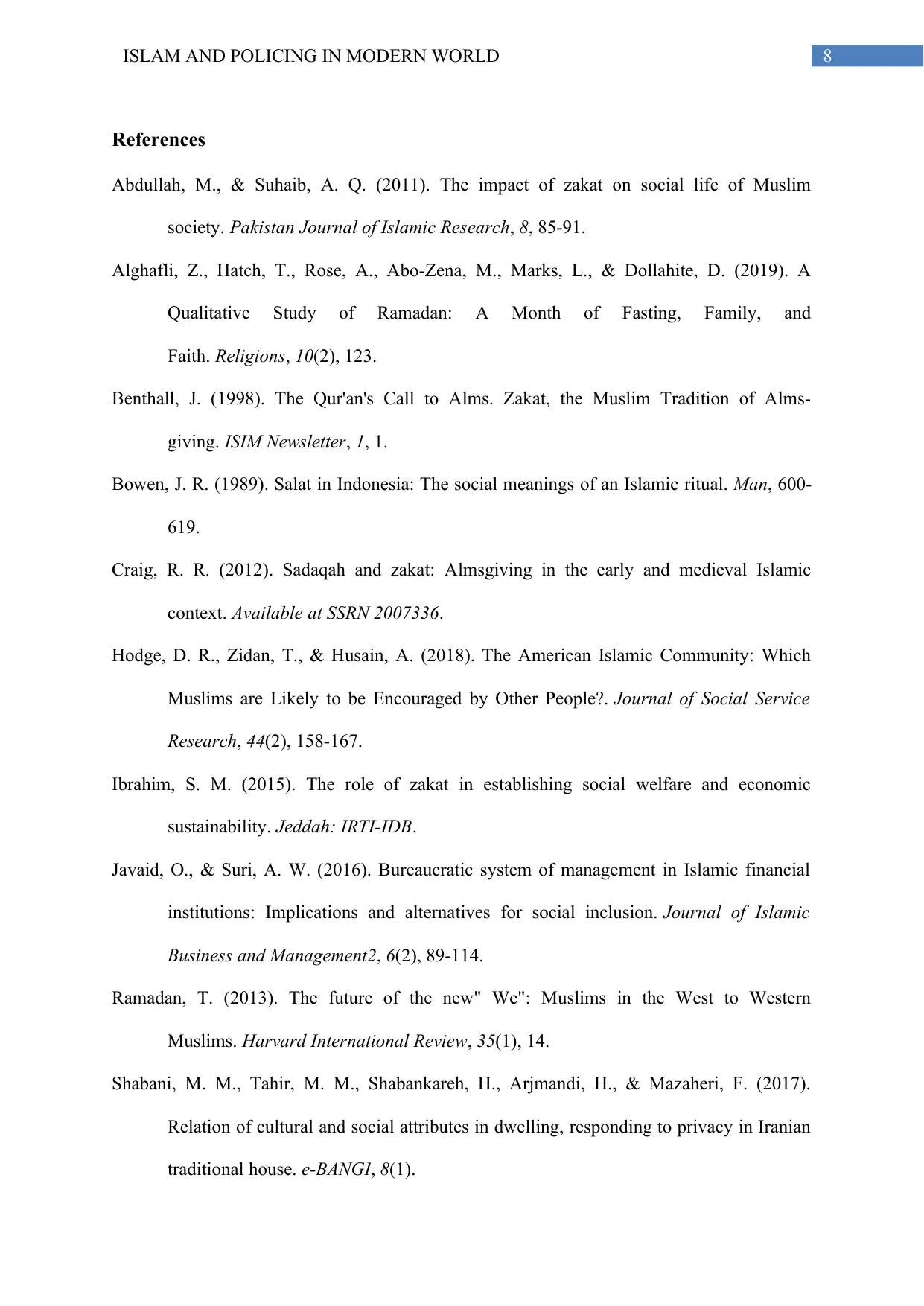
8ISLAM AND POLICING IN MODERN WORLD
References
Abdullah, M., & Suhaib, A. Q. (2011). The impact of zakat on social life of Muslim
society. Pakistan Journal of Islamic Research, 8, 85-91.
Alghafli, Z., Hatch, T., Rose, A., Abo-Zena, M., Marks, L., & Dollahite, D. (2019). A
Qualitative Study of Ramadan: A Month of Fasting, Family, and
Faith. Religions, 10(2), 123.
Benthall, J. (1998). The Qur'an's Call to Alms. Zakat, the Muslim Tradition of Alms-
giving. ISIM Newsletter, 1, 1.
Bowen, J. R. (1989). Salat in Indonesia: The social meanings of an Islamic ritual. Man, 600-
619.
Craig, R. R. (2012). Sadaqah and zakat: Almsgiving in the early and medieval Islamic
context. Available at SSRN 2007336.
Hodge, D. R., Zidan, T., & Husain, A. (2018). The American Islamic Community: Which
Muslims are Likely to be Encouraged by Other People?. Journal of Social Service
Research, 44(2), 158-167.
Ibrahim, S. M. (2015). The role of zakat in establishing social welfare and economic
sustainability. Jeddah: IRTI-IDB.
Javaid, O., & Suri, A. W. (2016). Bureaucratic system of management in Islamic financial
institutions: Implications and alternatives for social inclusion. Journal of Islamic
Business and Management2, 6(2), 89-114.
Ramadan, T. (2013). The future of the new" We": Muslims in the West to Western
Muslims. Harvard International Review, 35(1), 14.
Shabani, M. M., Tahir, M. M., Shabankareh, H., Arjmandi, H., & Mazaheri, F. (2017).
Relation of cultural and social attributes in dwelling, responding to privacy in Iranian
traditional house. e-BANGI, 8(1).
References
Abdullah, M., & Suhaib, A. Q. (2011). The impact of zakat on social life of Muslim
society. Pakistan Journal of Islamic Research, 8, 85-91.
Alghafli, Z., Hatch, T., Rose, A., Abo-Zena, M., Marks, L., & Dollahite, D. (2019). A
Qualitative Study of Ramadan: A Month of Fasting, Family, and
Faith. Religions, 10(2), 123.
Benthall, J. (1998). The Qur'an's Call to Alms. Zakat, the Muslim Tradition of Alms-
giving. ISIM Newsletter, 1, 1.
Bowen, J. R. (1989). Salat in Indonesia: The social meanings of an Islamic ritual. Man, 600-
619.
Craig, R. R. (2012). Sadaqah and zakat: Almsgiving in the early and medieval Islamic
context. Available at SSRN 2007336.
Hodge, D. R., Zidan, T., & Husain, A. (2018). The American Islamic Community: Which
Muslims are Likely to be Encouraged by Other People?. Journal of Social Service
Research, 44(2), 158-167.
Ibrahim, S. M. (2015). The role of zakat in establishing social welfare and economic
sustainability. Jeddah: IRTI-IDB.
Javaid, O., & Suri, A. W. (2016). Bureaucratic system of management in Islamic financial
institutions: Implications and alternatives for social inclusion. Journal of Islamic
Business and Management2, 6(2), 89-114.
Ramadan, T. (2013). The future of the new" We": Muslims in the West to Western
Muslims. Harvard International Review, 35(1), 14.
Shabani, M. M., Tahir, M. M., Shabankareh, H., Arjmandi, H., & Mazaheri, F. (2017).
Relation of cultural and social attributes in dwelling, responding to privacy in Iranian
traditional house. e-BANGI, 8(1).
⊘ This is a preview!⊘
Do you want full access?
Subscribe today to unlock all pages.

Trusted by 1+ million students worldwide
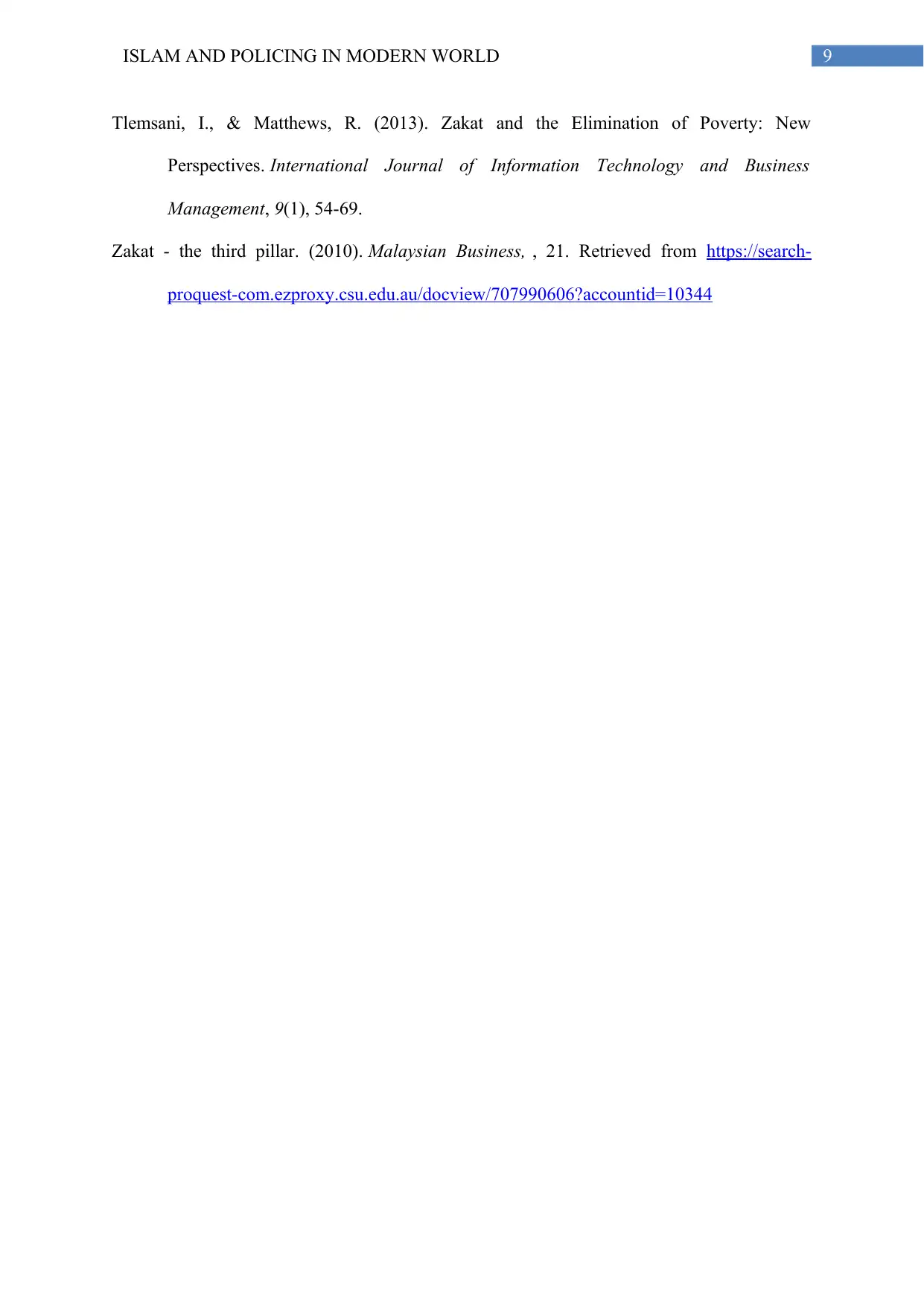
9ISLAM AND POLICING IN MODERN WORLD
Tlemsani, I., & Matthews, R. (2013). Zakat and the Elimination of Poverty: New
Perspectives. International Journal of Information Technology and Business
Management, 9(1), 54-69.
Zakat - the third pillar. (2010). Malaysian Business, , 21. Retrieved from https://search-
proquest-com.ezproxy.csu.edu.au/docview/707990606?accountid=10344
Tlemsani, I., & Matthews, R. (2013). Zakat and the Elimination of Poverty: New
Perspectives. International Journal of Information Technology and Business
Management, 9(1), 54-69.
Zakat - the third pillar. (2010). Malaysian Business, , 21. Retrieved from https://search-
proquest-com.ezproxy.csu.edu.au/docview/707990606?accountid=10344
1 out of 10
Your All-in-One AI-Powered Toolkit for Academic Success.
+13062052269
info@desklib.com
Available 24*7 on WhatsApp / Email
![[object Object]](/_next/static/media/star-bottom.7253800d.svg)
Unlock your academic potential
Copyright © 2020–2026 A2Z Services. All Rights Reserved. Developed and managed by ZUCOL.

